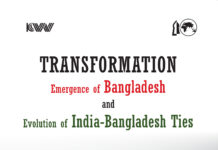‘2 top leaders must be more sensitive to democratic practice’

The country with key institutions of democracy in place still misses democratic practices posing a huge challenge for its democratic future and people genuinely expect from the two top political parties to deliver in terms of democratic practice.
“They (AL-BNP) are the largest flag bearers of democracy in the country, and people genuinely expect them to deliver in terms of democratic practice,” Dr Iftekharuzzaman, Executive Director of the Transparency International Bangladesh (TIB), said in an interview with UNB.
The reality is that, he explained, the future of democracy and the fate of 16 crore people of this country, their lives, liberty, democratic aspirations, rights, justice, safety and security remain in the hands of the two top political figures — Prime Minister Sheikh Hasina and BNP chief Khaleda Zia.
“They have the power, responsibility and obligation to be sensitive to public interests, and shape their politics to represent public aspirations in practice, not only on paper or in public speeches,” Dr Zaman said.
Referring to the two top influential leaders, he said both remain intransigent in their respective positions without any real effort to negotiate in a democratic spirit.
“…it’s a perennial battle to either remain in power or attain power at the expense of public interest and future of democracy…this mutually antagonistic position of the two sides for a contest of legitimacy for power has emerged as a huge challenge for the country’s democratic future,” he added.
Responding to a question, the TIB chief said whether the people of the country will be able to see a democratic government in the coming five years will solely depend on the maturity, acumen and sense of responsibility of two leaders who must be more sensitive to public interests and democratic practice.
Explaining how democratic practices remain missing in the country, he said, “We, for example, need both hardware and software to make a computer fully functional. Similarly, to get the desired benefits from democracy to meet the democratic aspirations of people, there has to be a perfect match of effective democratic institutions with democratic behaviour and practices.”
Responding to another question, the TIB chief said people usually find agreements on basically two types of motivations — one is when they have common objectives for which they may agree to work together and another is when they perceive common source of threats to their own security.
“Time has come that our leaders should perhaps realize that by their brinkmanship they have come to a stage that they should look at threats being created for their own.”
Dr Zaman also said these are the threats to democracy and threats of undemocratic forces gaining deeper and deeper grounds in political space. “If these are unbearable to the people of this country at large, these should be even more unacceptable for the two leaders.”
He mentioned that indeed, since the post-authoritarian transition a democratic institutional framework has been developed in the country over the years. “We’ve developed democratic framework but we have a long way to go before democratic practices are in place.”
Responding to a question on how democracy can be strengthened, the TIB chief said it will have to be ensured that the institutions of democracy are effective instead of being used for serving any particular sections of the society, especially for partisan political purposes.
Looking into the trend of two top parties political practices, he said the key problem is that the power-centric zero-sum game of election and politics is being allowed to take deeper and deeper roots. “Both sides appear to have a black and white approach where remaining in power or coming to power is the only option.”
In this approach, the premium of winning is extremely high, whereas the risk of losing is equally skyrocketing, the TIB chief added.
Responding to a question on recent violence, he said, “We’ve been witnessing very unusual, targeted and other newer types of violence. There have been attacks with petrol bombs on innocent people, arson attacks on state infrastructure. These must be effectively challenged right now and be prevented from recurring.”
Otherwise, he added, such violence may emerge as part of political culture pushing the country and its people into more ominous risks than the country has seen.
Asked about his New Year’s hope, Dr Zaman said, “There may not be much space to remain hopeful as we begin the New Year. We have passed the outgoing year with grave concerns for various reasons.”
He went on: “We may have to go through an open-ended period of uncertainty, violence and confrontation in the New Year too if the two top leaders fail to shun the zero-sum game and do not return to positive politics – politics for people’s welfare.”
Source: UNB Connect









